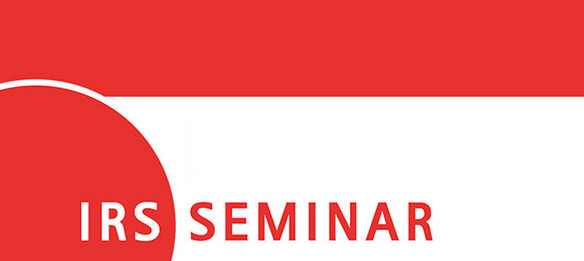Hauptinhalt
Spaces of Emergence – Emergent Spaces
IRS Seminar with Koen Frenken, Alica Repenning, Anna Oechslen and Angeliki Tzouganatou

Programme
09:30 Welcome
Prof. Dr. Oliver Ibert | Leibniz-Institute for Research on Society and Space
09:45 Social Mobility and Scientific Excellence
Koen Frenken | Utrecht University
10:30 Coffee Break
10:45 Platform Ecology
Alica Repenning, Anna Oechslen | Leibniz-Institute for Research on Society and Space
11:15 Opening up Platform Economy for Accessible Digital Heritage Knowledge
Angeliki Tzouganatou | Universität Hamburg
11:45 Discussion on overarching themes
Social Mobility and Scientific Excellence: On the Sudden Success of Dutch Science (1873-1933) | Koen Frenken

In this IRS Seminar Koen Frenken will present the paper “Social Mobility and Scientific Excellence: On the Sudden Success of Dutch Science (1873-1933)” by Koen Frenken with Giovanna Capponi & Mignon Wuestman.
The geography of innovation is a relatively new field of study that examines the spatial distribution of innovation. One of the key insight holds that innovation is highly clustered in space and that such geographic clusters tend to remain leading over long periods of time. Notwithstanding these statistical regularities, the question remains how new clusters can suddenly emerge to become a leading center within the global geography of innovation. The two main explanations for new cluster emergence have been proposed so far. First, coincidence: a lone entrepreneur may develop a highly successful company, which leads to a new geographic cluster via spinoffs. Second, migration: relocating scientists and inventors creating a new geographic cluster of innovation. The authors propose social mobility as a third mechanism through which a new center of innovation can emerge.
As an empirical case, the authors investigate the sudden rise of Dutch science in the early nineteenth century, with four Nobel Prizes in physics and one in chemistry, after a century of insignificant contributions and low international visibility. Historians attributed to Dutch success in science to the 1863-reform of Dutch high schools, which – unintendedly – provided a way for talented middle class pupils to enter the university system.
The paper aims (i) to scrutinize the social-mobility thesis using a new biographical database of over 100 Dutch scientists, and (ii) to extend the social-mobility thesis by pointing to the role of members of the Royal Netherlands Academy of Arts and Sciences (KNAW) as gatekeepers in the Dutch science system. Here, we build on the core-periphery framework developed by Gernot Grabher, Oliver Ibert, and Damon Phillips pointing to the social periphery as prime locus of “innovation” (here: students with a middle-class background) and the social core as the prime locus of “valuation” here: members of the Royal Academy. More specifically, the authors analyze statistically the success of all Dutch professors active in mathematics, physics and chemistry (for the period 1873-1933) looking at high school background and having access to Royal Academy members.
Short bio
Koen Frenken is Full Professor in Innovation Studies at the Copernicus Institute of Sustainable Development, Utrecht University. He holds a PhD from the University of Grenoble (applied economics) and the University of Amsterdam (social sciences) and received personal grants from EU Marie Curie, NWO Vidi and NWO Vici programs. Theoretical interests include evolutionary economics, institutional sociology and complexity theory. He works on breakthrough innovation, economic geography, platform economy and innovation policy. He currently serves as a member on the Committee on Platform Economy & Work of the Social and Economic Council (SER) in The Netherlands.
Platform Ecology: A User-centric and Relational Perspective on Online Platforms | Alica Repenning and Anna Oechslen
Alica Repenning and Anna Oechslen will present the paper “Platform Ecology: A User-centric and Relational Perspective on Online Platforms” co authored with Oliver Ibert and Suntje Schmidt.
A number of existing empirical studies on single platforms or types of platforms provide deep insights into the complexities and social dynamics characterizing individual functions. However, this rather segmented approach falls short of appreciating the increasingly seamless practices of users shifting between several platforms to perform a wide range of practices. Today, everyday life is interwoven with online platforms. Users seek for online opportunities to perform practices as different as learning to play music, communicating with friends and/or broader audiences, showing off or consuming goods. The respective platforms are interlinked to afford the seamless shifting between these different functions (e.g. from watching a music video to visiting an online shop). Furthermore, online and offline practices co-exist and interact in complex ways: sometimes online replaces offline, sometimes online and offline spheres overlap or even become inseparably intertwined. With this paper the authors seek to develop a heuristic to study this interdependence and the choices between different options people (have to) make. The ecological approach is characterized by four features. Firstly, it foregrounds the user’s perspective, studying needs, affordances, and interactions along the lines of specific user types (user-centric approach). Secondly, it highlights the co-existence and interdependence of several platforms. Thirdly, it delineates an augmented opportunity space. This implies an overlap of virtual and concrete spaces as well as temporality and flexibility of organization. Finally, it allows the exploration of the complex geography unfolding behind a seemingly local platform practice.
Opening up Platform Economy for Accessible Digital Heritage Knowledge | Angeliki Tzouganatou

During the past two decades, online platforms inundated the Internet promising to democratize and open up access to knowledge. However, crucial issues have been emerged through digital platform ecologies, concerning the openness of digital heritage knowledge in the platform economy. How the conditions of openness of cultural data affect participation and social inclusion of the public to access knowledge? Different “regimes” (e.g. copyrights, platform capitalism & monopolies of knowledge) influence the access & participation in knowledge production, as well as the formulation of certain memory modalities. What are the qualities and practices needed to be taken into consideration in an effort to cope with the growing inequalities that digital media technologies have brought in relation to digital economy? In her presentation, Angeliki Tzouganatou will discuss new business and social models for digital heritage knowledge towards an open fairer platform economy.
Short bio
Angeliki Tzouganatou studied Archaeology and History of Art at the National and Kapodistrian University of Athens and completed the MSc in Digital Heritage at the University of York (UK). Currently she is located at the Universität Hamburg, as a PhD fellow in the EU-funded POEM (Participatory Memory Practices) Marie Curie ITN project. She has working experience in various cultural heritage institutions including Leeds Museum and Galleries, the Benaki Museum, and Stavros Niarchos Foundation Cultural Center. Also, she has been involved in research projects such as EMOTIVE and Co-Production Networks for Community Heritage in Tanzania as a research assistant. Her scientific interests include digital heritage, platform ecologies and economies.

